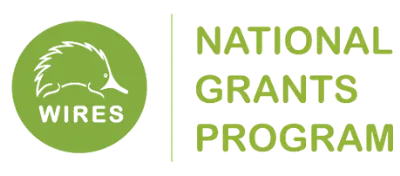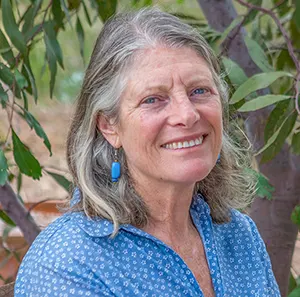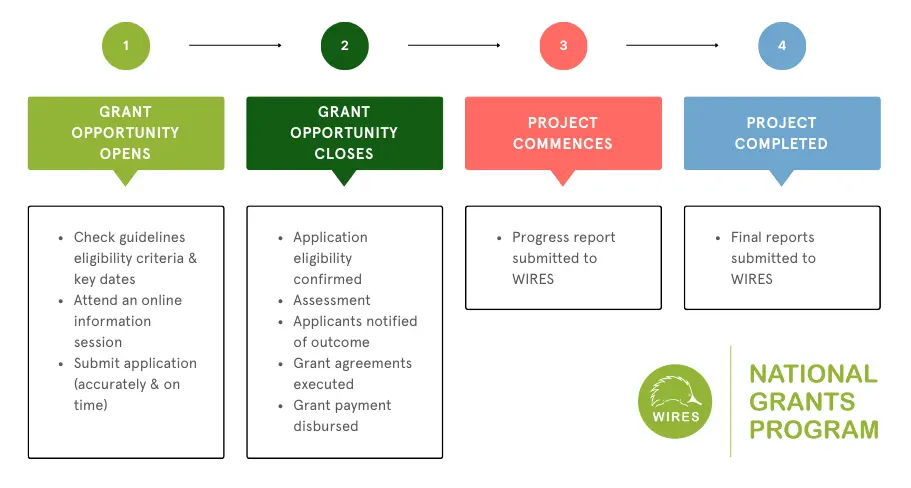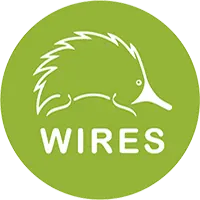National Grants Program

Applications for National Grants Program 2024 have now closed.
Introduction
Have you got a project that will improve outcomes for native wildlife and their habitats?
The WIRES National Grants Program (WIRES NGP) has been designed to support best practice rescue and rehabilitation of wildlife, an increase in emergency preparedness in the sector, along with native species recovery projects to improve long-term outcomes in Australia.
The challenges currently faced by our wildlife and the wild places they call home are immense.
At WIRES, we believe that collaboration is the key to delivering tangible project outcomes to effectively tackle these challenges. Projects that utilise the expertise of and share knowledge between wildlife rehabilitators, researchers, conservation professionals, citizen scientists and community groups will lead to the best outcomes for our precious native species.
Collectively, we can deliver the best long-term outcomes nationally for all native species.
In Year 1, 67 grants to improve outcomes for wildlife, were awarded across 4 Tiers, to groups in all states and territories. View 2021 National Grants Recipients
In Year 2, 75 grants to improve outcomes for wildlife, were awarded across 4 Tiers, to groups in all states and territories. View 2022 National Grants Recipients
In Year 3, 75 grants to improve outcomes for wildlife, were awarded across 4 Tiers, across Australia. View 2023 National Grants Recipients
Applications for Year 4 are now closed.
WIRES NGP Objectives
The WIRES National Grants Program (WIRES NGP) has been developed to provide ongoing support for wildlife, and their habitats, across Australia. WIRES focus is on proposals that have tangible, positive and ideally long-term outcomes for wildlife. Funding granted through this program is one-off and is for projects of between 6-12 months duration.
This is a competitive grants program. Demand is likely to outweigh available funds, and therefore eligible applications will be evaluated by an assessment panel. This assessment will be based on funding priorities, demonstrated need and the funds available.
Project outcomes should also support the objectives of the WIRES National Grants Program including:
- Building capacity and capability for the Australian wildlife rescue and rehabilitation sector.
- Improving emergency preparedness and response capabilities to assist wildlife.
- Preserving species and their habitat through projects leading to long term positive outcomes for native wildlife.
- Raising community awareness and inspiring broader community involvement in supporting Australian wildlife rescue, rehabilitation and preservation.
Funding Available
A total funding pool of up to $1,000,000 is available across four tiers or categories each year.
Eligible applicants are invited to submit proposals for:
Tier 1: Individually Licenced Wildlife Rescuers and Carers (maximum $2,000)
Tier 2: Licenced Wildlife Rescue and Rehabilitation Organisations (maximum $8,000)
Tier 3: Environmental NGOs and Community Groups (maximum $20,000)
Tier 4: Consortia/Multi-partner Collaborations (maximum $50,000)
There are three special grants being offered this year:

The Mikla Lewis OAM Habitat Restoration & Enhancement Grant
When Mikla Lewis OAM founded WIRES in 1986, little did she envisage that 35 years later the organisation would have expanded from a single branch in Sydney to 28 branches and more than 3500 members. She decided to form WIRES, with the help of a small group of people from various environmental organisations, following a report of an injured ibis in Sydney’s Hyde Park when none of the existing animal welfare bodies had either the jurisdiction or the resources to implement a rescue.
Mikla’s foresight and knowledge led to the rescue and rehabilitation of thousands of native animals.
To this day, she continues to be a dedicated WIRES volunteer.
This grant will be awarded to a project, or projects, that involve habitat restoration, renovation, or enhancement.

Pat Connors Avian Grant
Patrick Connors was a long-term member of WIRES. He developed WIRES first rescue and rehabilitation database and call recording system pro-bono and supported it for well over a decade. Pat's contribution enabled WIRES to provide rescue advice and assistance for more than 1.5million animals since its creation. Pat sadly passed away in December 2020 and the grant is to honour Pat's outstanding contribution and his passion for birds.
This grant may be awarded to one large avian project or a series of smaller avian projects.

The Helen George OAM Mammal Grant
From the moment WIRES was founded, Helen George's expertise in wildlife rescue and care was invaluable. Helen's involvement with WIRES as a carer, trainer and mentor lasted more than 30 years, until her passing in 2017. When WIRES received its very first call for a wombat in distress, it was Helen's advice that was sought. Over the years, Helen developed and delivered mammal training courses and trained hundreds of volunteers. This grant is a tribute to the invaluable support and expertise Helen provided to WIRES and is a nod to her particular love of wombats, macropods and bats.

Grant Process
Key Dates
Applications have closed!
Online webinar #1 - 12.30pm AEST 23rd July 2024 Register Here
Online webinar #2 - 7.30pm AEST 24th July 2024 Register Here
Applications close – 18th August 2024
Successful applicants notified - November 2024
Grant announcements and unsuccessful applicants notified - December 2024
Tier 1 & 2 Reports due – 9 May 2025
Tier 3 & 4 Reports due - Progress report 9 May 2025, Final report 21 November 2025.
How to Apply
Please note that due to limited funding and a competitive assessment process, not every application that meets the eligibility criteria may receive a WIRES Grant.
- Click on APPLY NOW link when available to access the WIRES Grant Portal
- Create account or log in. Please note that you will need to tick “Yes” to receiving notifications if you wish to be sent confirmation of application submission.
- Read information on the home page
- Click on “Start application”
- Select your State/Territory
- Select “WIRES National Grants Program 2024” and then the appropriate tier.
- If you wish to leave a partially completed application, make sure you press ‘Save + close’ and log out.
- You can log back in and continue to edit your application form until you are ready to submit.
- To submit your application, select the ‘Submit application’ button.
- Note, no changes can be made once this is selected.
- You will receive a confirmation email when your application has been successfully received. If you do not receive an email, please ensure you check your junk mail and add us to your safe sender list.
WIRES National Grants Program Guidelines.
FAQs
Answers to frequently asked questions can be found at the end of the WIRES Grant Guidelines.
If you still have questions or require any further information after reading our FAQs, you can email the WIRES Programs Team grants@wires.org.au
If you are an Australian wildlife rescue or care group then we do have training grants open that offer access to WIRES wildlife rescue and rehabilitation training.
